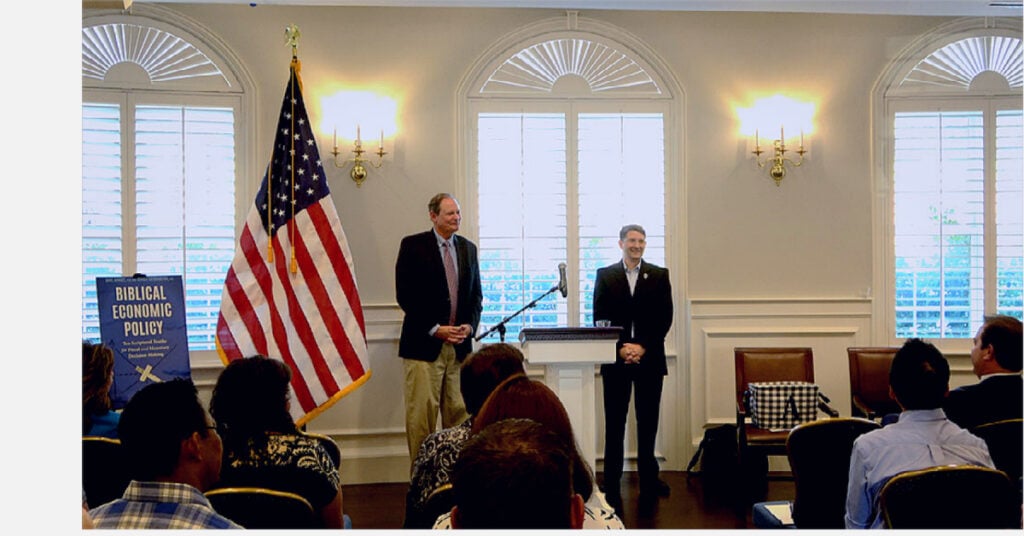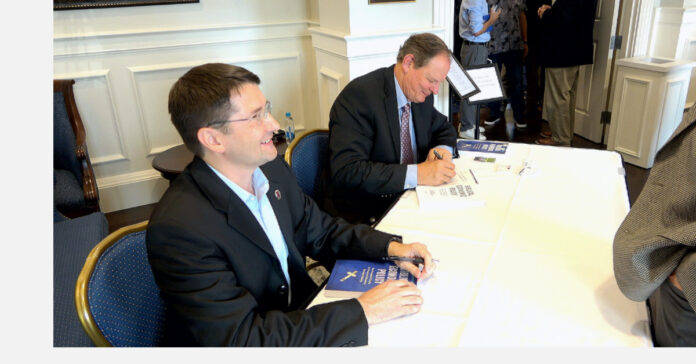“Biblical Economic Policy,” is a thought-provoking new book written by my favorite former teacher at Dallas Baptist University, Dr. Dave Arnott, and his colleague, Dr. Sergiy Saydometov. It’s so well written that it held my interest even though I’m no economics expert. The book provides a fascinating look at how Biblical principles speak to current economic conditions.
I read the book after attending a July 19th book signing for the co-authors. The two professors are from widely different backgrounds, but share the same worldview. Dr Saydometov came to the U.S. from the Ukraine in 2001, and graduated from DBU with a PhD in Finance. He now teaches finance and economics in their College of Business.
Midlothian Residents
Dr. Arnott was born in the U.S., and his PhD is in strategic management and economics. He has taught at DBU 29 years, and currently teaches economics. Arnott and his wife Ginger live on a farm just outside Midlothian.
The combination lecture/book signing/reception was packed with former students, friends and family, teaching colleagues, and DBU staff members. Midlothian Mayor Richard Reno and his wife also attended, along with other members of the community.
Ten Commandments of Biblical Economic Policy
The well-researched book outlines those ten commandments, and asks such important questions as: “How does a first century book inform a 21st century economy?”
Dr. Arnott said, “The Church-State relationship is out of Biblical alignment. The book attempts to explain that mis-alignment and suggest steps to re-align it. Christians care about the means, while economists care about the ends.”
A common misconception, he said, is that the Government must take before it can give, but there is no Biblical command to take. The Government should punish evil, but not do good. The Church should do good, but not punish evil.
Fiscal and Monetary Decision-Making
1. People Should be Free. God gives humans the freedom to accept or reject His offer of salvation, so it’s reasonable to assume He wants people to have as much freedom as possible in our economic choices.
2. Work is Good. God is working in Genesis 1:1. God made something out of nothing. We are called to make something out of something.
3. Don’t Steal. This assumes private property.
4. Don’t Covet. Most complaints about income inequality are violations of the tenth commandment.

5. Use Honest Measures: The government uses dishonest measures when it takes on debt, and the Federal Reserve Bank does this by increasing the money supply.
6. Trade is good. When people exchange what they have for what they don’t have, in a competitive environment, both parties get richer.
7. Love Your Neighbor as Yourself. If you love your neighbor, you will supply him with products and services he demands. If you love yourself, you will make a profit while doing it.
8. Take Care of Widows and Orphans: The Church is commanded to do this. The Government is not.
9. Be a Good Samaritan. He was a capitalist, because he used his own money to care for the man.
10. Honor Those in Power: We should follow the rules of authorities over us, because we believe God put them there.
Excerpts from Biblical Economic Policy
Some of the more profound excerpts from the book remind us that Jesus was involved in the production and distribution of scarce furniture as a carpenter. Other excerpts state, “A market is where everyone votes, and free is not the same as freedom. College education can be provided free, but it can’t be produced free.”
“In China, there are no rights, because there is no right. The cultural revolution redistributed food that killed 60 million in three years. Then in the following 20 years, a step toward free markets pulled 760 million out of extreme poverty. Economics matters.”
“Minimum wage causes the two evils of macroeconomics: Inflation and unemployment. Policies that promote production is all that separates rich from poor nations. Everyone in America is taught the tools of wealth creation in an information economy: Keyboarding.”
Dr. Arnott said, “60% of people under the age of 24 voted for a socialist in the last election, but in 25 years of teaching, none of my more than 5000 students have asked to redistribute their grade to a student who skipped class.”
Christian Worldview
“The reason there are 2.2 billion Christians in the world, is because their worldview fits reality,” is a quote from the book. Also: “If you love your neighbor, you will provide products and services she demands. If you love yourself, you will make a profit. Love your neighbor = consumer surplus. Love yourself = producer surplus. Most religions believe you behave to be saved. Christians believe we are saved to behave.”
Biblical Economic Policy is priced at $16.99, and available from online book sellers and the DBU book store. Dr. Arnott says he is planning another book that will be taken from the 90 podcasts released on the Dave Arnott YouTube channel or at davearnott.com. The working title is “Controversial Topics in Christian Economics.”












